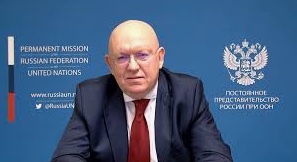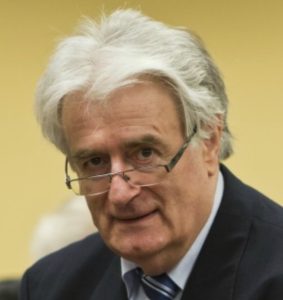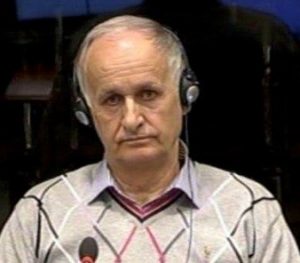
President Gatti Santana briefs UN Security Council on progress of Mechanism’s work
President Arusha, The Hague
11 Jun 2025
Press release
Today, the President of the International Residual Mechanism for Criminal Tribunals (Mechanism), Judge Graciela Gatti Santana, presented the Mechanism’s twenty-sixth progress report to the United Nations Security Council (Council) in New York.
President Gatti Santana began her address by noting the upcoming 30th commemoration of the 1995 Genocide in Srebrenica, describing it as a “moment of historical and moral significance”. She underscored the vital role played by the ad hoc Tribunals in judicially establishing the Srebrenica Genocide and the 1994 Genocide against the Tutsi in Rwanda—landmark findings that have since been affirmed by the Mechanism.
Recalling the Council’s vision of the Mechanism as a cost-effective and temporary structure, President Gatti Santana emphasized the Mechanism’s continued focus, fairness and efficiency in the execution of its mandate. In this context, she reported on recent judicial activity, including the swift resolution of Mr. Gérard Ntakirutimana’s review proceedings. The President observed that, during the reporting period, Mechanism Judges issued over 100 decisions and orders, most of them in relation to continuous judicial functions such as the variation of witness protection measures.
The President also provided updates regarding sentence enforcement and contempt matters, highlighting that the Mechanism has narrowly exercised its contempt jurisdiction, with two recent cases referred to national authorities in line with the Statute and the referral of another case currently under consideration.
Turning to State cooperation, President Gatti Santana stressed that this “remains pivotal not only to the Mechanism’s efforts to reduce costs and complete key functions but to fulfilling the humanitarian principles upon which international criminal justice is founded”. She drew particular attention to the ongoing detention of Mr. Félicien Kabuga, whose trial was indefinitely stayed in 2023, noting that the absence of a willing and suitable State for his provisional release raises due process concerns. Separately, while expressing profound appreciation for the support provided by the Mechanism’s current enforcement States, the President reiterated the pressing need for additional States to accept enforcement responsibilities. Doing so, she explained, would help reduce the Mechanism’s operational footprint and end the prolonged uncertainty faced by convicted persons awaiting transfer.
As further evidence of the critical importance of State cooperation, the President identified two unresolved matters: the long-standing situation of the acquitted or released individuals who were relocated to Niger in December 2021, and Serbia’s persistent refusal to execute outstanding arrest warrants against Mr. Petar Jojić and Ms. Vjerica Radeta, despite its legal obligations and the repeated referrals of the matter to the Council.
Looking ahead, President Gatti Santana discussed Council resolution 2740 (2024), which tasks the United Nations Secretary-General with providing reports on options for the transfer of certain Mechanism functions and possible locations of the archives. She shared her perspective on the potential transfer of the supervision of sentence enforcement function, acknowledging that specific administrative aspects—such as oversight of detention conditions—could be delegated to States. However, the President strongly cautioned against transferring responsibility for the adjudication of applications for pardon, commutation of sentence or early release of convicted persons. She warned that this would result in unequal treatment of the Mechanism’s more than 40 convicted persons and “undo decades of work that, until this point, has held impunity in check”.
The President observed that the Mechanism’s continuous judicial functions implicate fundamental rights, ensure witness protection, and remain essential to the integrity of international proceedings. While workable, just, and fair solutions for the transfer or even termination of certain functions may emerge as activity declines, it remains preferable—while judicial work continues apace—to retain these functions at the international level, ensuring that the interests of justice are protected before any such changes are made.
In bringing her remarks to a close, President Gatti Santana noted that the upcoming 30th commemoration of the Srebrenica Genocide is a reminder that “justice is not a finite endeavor; it is a continuous commitment”. She reaffirmed in this respect that, despite today’s global challenges and limited resources, the Mechanism remains dedicated to its mandate. At the same time, she acknowledged that changes are necessary to ensure that the Mechanism’s remaining contributions to the justice cycle are delivered at a cost the international community can support. “[W]e will partner with this Council”, the President concluded, “as it seeks to preserve the legacy of the Tribunals for Rwanda and the former Yugoslavia in a further reduced Mechanism and, ultimately, beyond its operational lifespan”.

Statement by Permanent Representative Vassily Nebenzia at a UNSC Briefing on the International Residual Mechanism for Criminal Tribunals
1 June 2025
https://russiaun.ru/en/news/211062025
Madam President,
The regular reports by the International Residual Mechanism for Criminal Tribunals (IRM; Mechanism) to the Security Council are one of the issues that divert the Council’s attention from genuinely important matters on its agenda.
Today’s meeting should have served as a platform for discussing practical issues related to the drawdown of the Mechanism, which has already completed its judicial and prosecutorial functions.
Instead, time and again, our briefings on this issue have been used to prove that even today, when the Organization is beset by a financial crisis with proposals for significant cuts in place, the outdated Mechanism is something that must remain unchanged having 234 staff members and a budget of $61 million at its disposal.
Let us recall that the Mechanism was established by the Council 15 years ago as a small, purely temporary structure with a small staff – this is the language from the relevant resolution dating 2010.
Let us look for a comparison. For example, the International Maritime Organization (IMO) has 300 international staff members, while the International Court of Justice – a principal judicial body of the United Nations that has more than twenty cases on its docket in addition to advisory opinions – has about 100 staff members.
At the same time, no one has ever decided that the above-mentioned organizations are supposed to be small or temporary. Thus, by submitting a report to the Council, the IRM is simply mocking the instructions of the body that established this very mechanism.
We would like to note that the 234 positions at the Residual Mechanism are not an exhaustive list: the report contains a strange postscript stating that this figure does not include a number of positions – for example, staff members in charge of the interaction with the Office of Internal Oversight Services. Thus, we do not know for certain how many employees the Mechanism has, which appears to be nothing but a blatant intent to mislead the Security Council.
We do not agree with such an approach. Given the liquidity crisis in the UN and the Secretary-General’s initiative for a 20% cut in personnel and budget in all active (and I emphasize the word “active”), not residual areas of the UN’s work, this temporary and residual structure should be closed in order to free up resources for the UN priority objectives, first and foremost, for maintaining international peace and security.
This objective can be easily attained – the Council needs to agree on distributing the few Mechanism’s residual functions (which the IRM itself perfoms exceedingly poorly) among the existing UN departments and Member States.
The Prosecutor’s report contains some similar proposals that warrant our close consideration. We would like to highlight here that we acknowledge that we the function of victim and witness protection has “de facto” been handed over to states, which is something we have long been discussing. We expect greater details and specifics about this in the next report.
However, the President’s report doesn’t envisage any specific options for transferring the functions, nor does it state even any intention to complete the work in principle. Instead, it is proposed that Council members extend the existence of the IRM for it to supervise the enforcement of sentences, i.e. until the period after 2040.
This is an unacceptable approach, especially given the IRM’s utter inability to perform its monitoring function.
Countries where sentences are served, such as the United Kingdom and Estonia, continue to disregard even the UN Minimum Standard Rules for the Treatment of Prisoners (the so-called “Nelson Mandela Rules”). The Serbs who serve sentences there are barred from meeting with their relatives or lawyers because the latter are not being granted visas to enter these countries; they are not allowed to use telephone or the Internet, their banking accounts and transactions are being blocked, they are not being provided with adequate medical care, their applications for early release following serving out two-thirds of their sentences are being denied, and they are subjected to psychological and physical violence.
Let us share with you some specific examples. 79-year-old Radovan Karadzic, who is serving his sentence in the United Kingdom, has not seen his relatives for four years, as they have been systematically denied entry visas. Moreover, the British authorities refuse to pay for the services of a lawyer who is licensed to work in the United Kingdom.

In this way, Mr. Karadžić has been cut off from any contact with the outside world and deprived of the right to proper defense. All this is being done in order to continue violating his rights with impunity. The prisoner suffers from diabetes and yet he does not receive a special diet that would be appropriate to his condition and is denied access to vital medications. As a result, his health is constantly deteriorating. Despite the advanced age and the serious condition of this Serb, the penitentiary administration is imposing so-called “enhanced security measures” against Mr. Karadžić, stating that he is allegedly preparing for jailbreaking, with these measures being actually nothing but torture. For example, the light in his cell is constantly on, including during night time. Let us recall that forced sleep deprivation through exposure to light or sound constitutes torture.
We drew the attention of the Mechanism to this situation six months ago, urging the body to fulfill its monitoring functions and visit the prison, but this, however, never happened. The president of the court tends to trust what London is saying. If London says that they are not violating anything, then there is no need to check.

There have also been ongoing violations of the rights of Milan Lukic, who is serving out his sentence in Estonia. He has lodged numerous complaints with the Mechanism, but his complaints were not upheld.

Another convict, whose rights have been violated is Radislav Krstic – in April this year he was transferred to Estonia to serve his sentence following an assault by his fellow inmates in a British prison after which he had his leg amputated.
It is noteworthy that, as we understand, the prisoners are being held in an Estonian prison in Tartu, whereto 600 prisoners from Sweden are to be transferred to serve their sentences under a bilateral agreement. Estonia has apparently decided to make a name for itself as the prison capital of the world. Local human rights activists are sounding the alarm: Won’t such a massive influx of prisoners affect the conditions of imprisonment? It is unclear whether the Mechanism is aware of this problem, since the report says nothing in this regard. Well, this is how the supervision function is being carried out.

Now let’s turn to what is happening at the UN Detention Unit in The Hague, which is essentially under the direct oversight by the IRM. Serbian General Ratko Mladić, who is being held there, is practically immobile, he is suffering heart and kidney failure, swelling of the heel bone, infected bedsores, and body weight loss to 51 kg. I would like to emphasize that bedsores are an indication of a lack of proper care. There is a high risk of heart attack, thromboembolism, and sepsis from bedsores. The medical personnel do not speak Serbian and are unable to provide daily care nor timely medical assistance. According to the information that we received from his relatives, healing in his condition is virtually impossible – what is required is palliative care, which is not being provided to him. According to Mr. Mladic’s son, since September 2024, medical staff have been insisting that his father consent to “do not resuscitate” order in the event of a threat to his life, and now they claim that the general has allegedly given his consent to this. Given Mladić’s diagnosed dementia, his relatives believe that medical staff are taking advantage of his vulnerable condition.
In light of the above-mentioned, we consider that it was highly inhumane on the part of the President of the Mechanism to reject in 2024 the request for his early release on humanitarian grounds or to allow him to serve the remainder of his sentence in Serbia.
Such an approach stands in stark contrast with how Mr. Kabuga is being treated – his case was terminated due to the state of his health. We demand that the Mechanism immediately review its decision regarding Mr. Mladić and transfer the general to Serbia to serve the remainder of his sentence. We emphasize that all responsibility for any possible negative developments will be borne by the Mechanism and the President thereof.
The convicts were sentenced to imprisonment, not to death by years-long torture under the UN supervision.
Against this backdrop, the only option that can guarantee the very basic rights of Serbian prisoners is their expeditious handover to the country of their citizenship to serve the remainder of their sentences.
And when it comes to the remaining functions, this is precisely the most viable option. We call upon the Mechanism’s leadership to provide in its next report to the Council and in its contribution to the reports of the UN Secretary-General, detailed, practical, and feasible proposals for the handover of all residual functions, which will help to completely wrap up its operation.
There is no need to include in the report options that have already been rejected, such as the creation of the so-called “omnibus” residual mechanism for all ad hoc tribunals or the transfer of all cases to the so-called International Criminal Court.
We wish once again to caution against attempts to artificially extend the life span of this structure by initiating new so-called contempt of court cases.
Madam President,

The Mechanism is a successor of the infamous ICTY, which will always be remembered for its unjust approaches, double standards, and politicization. In March, we were surprised to learn that one of the Mechanism’s judges had received a criminal conviction in the United Kingdom. She was sentenced to six years and four months in prison for engaging in “modern slavery.” We would like to note separately that informing the Council about such matters after the fact, when everything has already transpired, is not only extremely unprofessional on the part of the IRM, but also constitutes a deliberate concealment of the judge’s involvement in the crime. On the whole, this situation only proves that the Mechanism’s claims about some kind of “legacy” and lofty standards have no leg to stand on.
It should be clear to all members of the Security Council that the Mechanism can no longer continue to exist and must be shut down.
Thank you.